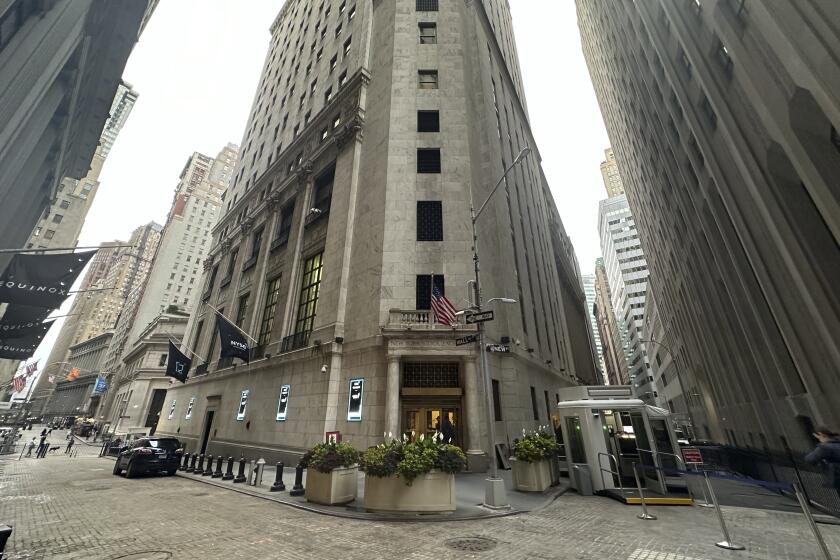It’s a Sticky Business That Keeps Parade From Coming Unglued
Peg Edey of Huntington Beach was hard at work one recent morning, brushing rubber cement on bright green eucalyptus leaves that would become the scales on a life-size dinosaur figure.
As part of Southern California’s annual Tournament of Roses frenzy, Edey was in the cavernous Fiesta Parade Floats Co. workshop in Duarte, among hundreds of workers swarming over 16 floats, sticking on leaves, bark, seeds and flower petals. A dab per leaf, about 120 gallons per float, they were brushing on the glue that literally holds the Tournament of Roses together.
By this morning, the parade’s 57 floral extravaganzas--costing from $50,000 to more than $300,000 each--will have soaked up more than 5,000 gallons of sophisticated adhesives--nearly all of which was supplied by one small company, Coral Industries Inc. of Santa Fe Springs.
Coral, comprising owner and chemist Louis Caldarelli, his secretary and three factory workers, trotted out its first parade glues 11 years ago. Since then, the private company has overcome established competitors, environmental regulations and occasional failures to develop a line of glues that have practically muscled the big players in the adhesives industry right off the parade route.
“Our customers keep sticking with us,” cracked Robert J. Dickey of Carlsbad, who contracts as Coral’s outside salesman and service consultant, and who has played a big part--by being on call nights and weekends and mixing up emergency batches right in the float barns--in helping the firm lock up most of the parade business.
Coral, with annual sales of just under $1 million, primarily manufactures bonding agents for interior paneling, insulation and seat-flotation devices in aircraft. During the holidays, normally a slow time in the adhesives industry, production at Coral shifts almost entirely to float-building products.
“Instead of two weeks’ vacation every year, we get two weeks of work,” Caldarelli said. The parade accounts for about 10% of Coral’s annual business, he said.
Caldarelli and Dickey first met when they worked together as research chemists at what is now 3M Corp. Caldarelli established Coral in 1968 with two investors whom he later bought out. Dickey later went on to work as a technical director for Wilhold Glues Inc. When Dickey retired in 1985, recalling his years growing up in Pasadena watching the parade every year, he suggested to Caldarelli that they take a flier at the float business.
Since then, they’ve cooked up a line of products tailor-made for Rose Parade float artisans, who now buy at least 90% of their adhesives from Coral.
The float builders want glues that set up quickly, can hold delicate flowers firmly--without damage--and are “idiot-proof,” as Dickey puts it--that is, easy to use by workers with a minimum of training.
“When we make something, we test it and test it and retest it,” Caldarelli said, glancing out the window of the small office in his 7,000-square-foot manufacturing plant. “We’ll get flowers from the flower beds and do tests with those.” Flowers will turn black if the glue is too harsh or fall off the float if the glue is too mild, he said.
“We’ve got a good thing going with Coral,” said Scott Lamb, art and floral director at Phoenix Decorating Co. of Pasadena, which constructed 26 of this year’s floats. “If it’s 11 o’clock we can call and say, ‘Get out of bed and go down there and make us some glue.’ They know how busy we are and how important it is to our business.”
Coral’s share of parade-glue sales began to soar after the South Coast Air Quality Management District’s massive 1989 clean-air plan. The regulations banned highly effective but smog-producing solvents, thereby playing havoc with the quality of floral adhesives, as chemists scrambled to mix usable products that met the new standards.
After two years of frustrating experimentation--stories abound of large areas of float decorations suddenly discoloring or sliding off to the ground--the float builders trooped before AQMD directors, who in 1991 agreed to exempt otherwise illegal solvents in the construction of parade floats.
“We don’t have a problem with floats,” said AQMD spokesman Bill Kelly. “Typically, they would not create an air-quality problem since around this time of year we don’t have ozone pollution, and the quantities they use are fairly small.”
But the changing rules gave tiny Coral a leg up on the Goliaths in the business. Larger manufacturers apparently found it too expensive to modify mass-produced products for a niche market. By the time the rules were relaxed, Coral had cornered the float business.
Kathy Petersen, a spokeswoman for $10-billion-a-year 3M Corp. of St. Paul, Minn., acknowledged that Coral gobbled up most of the Tournament of Roses business share by “aggressively going in there and aiming at that market.”
“We have concentrated on the industrial markets, but in a year or two down the road we will be selling more into the consumer market,” she said. “We hope to make inroads and cut their market share down.”
Meanwhile, the float builders are sticking with Coral.
Jim Hynd, vice president of Fiesta Parade Floats, said Dickey has spent many hours in the Fiesta workshops over the years, working with Hynd’s employees while developing floral glues. “Glue is one of our major expenses,” Hynd said. “Labor is our biggest expense, flowers are second and glue is third.”
Although the flowers are said to perk up in damp conditions, such as Southern California has experienced lately, the weather can pose unexpected problems for the adhesives. Phoenix Decorating’s Lamb recounted an icy night a few years ago when the glues got so cold they clumped and refused to hold--even with the use of special electric-warming belts that wrapped around the 5-gallon buckets. Dickey answered a panicky call for help with fresh solvents, which he mixed in the back of his pickup truck.
Rain isn’t a concern, said Caldarelli. Once the glue sets, it will hold even during a downpour.
Dickey says that these days, he takes it all in stride.
“Our first parade, I sat there and prayed: ‘Please don’t let them fall off.’ ” Now, he stays home and watches the show on TV.
“I’ll look at a head and say, ‘There goes our [glue No.] 4137.’ And if there’s some petaling on the face I’ll say, ‘There’s the sticky glue, the 4026.’ I know what they’re doing out there.”
More to Read
Inside the business of entertainment
The Wide Shot brings you news, analysis and insights on everything from streaming wars to production — and what it all means for the future.
You may occasionally receive promotional content from the Los Angeles Times.










